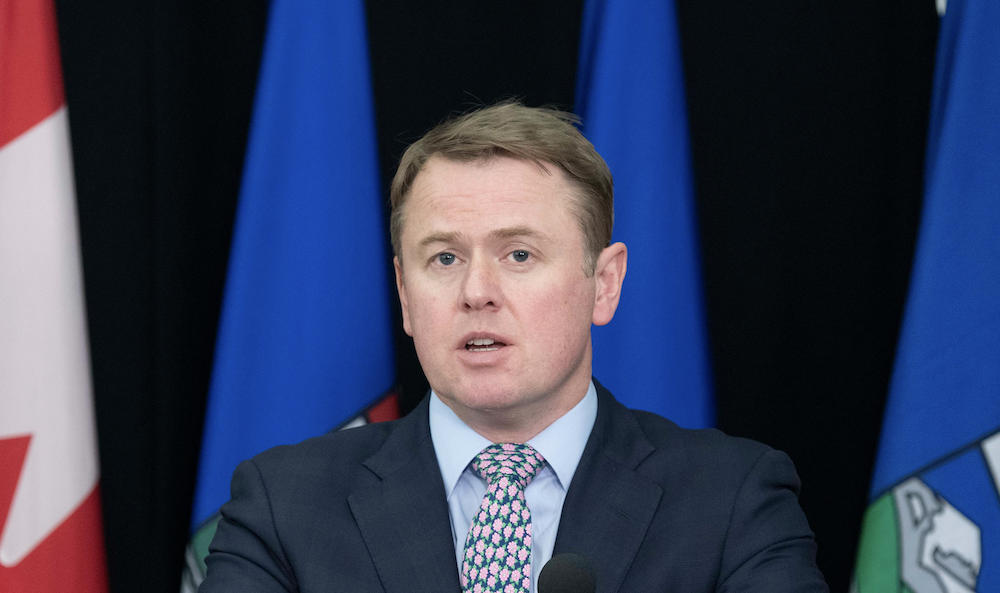After letting it sit un-proclaimed in legislative limbo for nearly a year, the Kenney government has finally gotten around to taking the necessary steps to bring its politician-recall legislation into force.
In a press release issued Wednesday, the United Conservative Party government announced the Recall Act and its sister act, the Citizen Initiative Act, would both come into effect on Apr. 7.
Cabinet orders yesterday filed by Justice Minister Tyler Shandro made the announcement official.
The Recall Act and the Citizen Initiative Act were passed by the Alberta Legislature on June 15, 2021. They received Royal Assent on June 17.
They have been gathering dust on a shelf somewhere in the legislature building ever since, unable to be used against Kenney or abrasive ministers who had made themselves unpopular like Kaycee Madu, who sponsored the bill as justice minister when it was introduced, or Shandro. Both ministers have been shuffled like a deck of cards.
But under the heading “giving Albertans a stronger voice in democracy,” Premier Jason Kenney, Municipal Affairs Minister Ric McIver, and Shandro were all assigned anodyne quotes in yesterday’s press release about how this was yet another promise made, promise kept.
The two acts will give Albertans “greater say in the democratic process” and “are among the most important democratic reforms in Alberta history,” Kenney said in his official quotes. Both these claims are pretty dubious propositions when you actually think about the legislation.
Back in May 2021, the NDP opposition made the case that the Recall Act did the opposite of what it was supposed to do. In fact, said Edmonton-Whitemud MLA Rakhi Pancholi at the time, it “makes it effectively impossible to recall current UCP MLAs.”
The act “is toothless and fake because the UCP knows that a genuine recall act could put many UCP MLAs in danger,” tweeted Calgary-Bhullar-McCall MLA Irfan Sabir the same day. “Jason Kenney thinks he can deceive Albertans simply by passing a bill that says ‘recall’ on it.”
The NDP MLAs’ claim was based on the fact that since the bar in the Recall Act seems too high to ever get an MLA recall motion onto a ballot, it renders the whole process meaningless except as a way of generating a few headlines and leaving inattentive voters with the impression that they’re the boss.
The act gives the organizer of a recall petition for an MLA only 60 days to gather signatures from 40 per cent of the eligible voters in their constituency—so, for example, you’d need to get nearly 20,000 legal signatures on petitions in two months to skid Calgary-Acadia’s MLA, who happens to be Shandro.
The Recall Act also applies to elected municipal officials and school trustees. For municipal officials, a petition organizer would require signatures from 40 per cent of the population in the municipality or ward.
For school board trustees, the organizer would have 120 days to get signatures from 40 per cent of the eligible voters in the school district or ward, perhaps a somewhat more manageable task.
Once that hurdle has been passed, though, a simple majority would theoretically be enough to remove the politician.
As for the Citizen Initiative Act, which the government used to call an “on-ramp to the legislative process,” it would supposedly let petitioners force the enactment of new laws or amendments to old ones.
It would require promoters of petitions to add or amend a law to gather signatures from about 280,000 people in two thirds of all electoral districts within 90 days. A constitutional referendum would require about 560,000 signatures in the same time frame.
So this still sounds like grandstanding unlikely to result in any meaningful change not desired by the government of the day, which has the tools in the bill to checkmate any proposal it doesn’t want enacted.
Expect this act to be used only by right-wing lobby groups working hand-in-glove with right-wing governments that don’t want to look too responsible for ideologically motivated legislation. Taxes to support public transit would be a particularly vulnerable target.
As their popularity declined with Alberta voters through the pandemic, Kenney and his MLAs came under steady fire for not bringing the legislation into force.
Combined with the steady repetition of the promise made/promise kept mantra by Kenney, his ministers and MLAs, yesterday’s development seems seems likely to fuel more rumours that an early election is in the wings if the premier manages to survive his April 9-May 14 leadership review mail-in vote.
Should a government MLA face a serious recall threat after the next election, Alberta voters can expect the Recall Act to disappear just as fast as one with the same name did in 1937, when Premier William Aberhart found himself facing a revolt by his own Social Credit supporters.
Alberta’s original Recall Act had been one of Aberhart’s election promises in 1935, and it must have seemed like a good idea at the time.
When it was turned against him in his Okotoks—High River Riding, though, it was swiftly repealed by his supporters in the Legislature. In the next general election, Aberhart prudently switched to a more reliable urban riding in Calgary.



